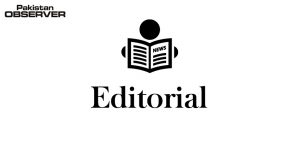SEVEN months after the beginning of the new financial year (2021-22), the Government came to the conclusion that the GDP growth rate during the last fiscal year (2020-21) was 5.37% and not 3.9%, which too was revised earlier from the initial 2.3%.
Federal Ministers Asad Umar and Hammad Azhar proudly announced that the national economy would grow by 5.4% during the ongoing financial year.
It is for the economic experts to analyze the impact of a shift in the economic baseline on the new growth rate for the past year as the Statistics Bureau changed the baseline to 2015-16 under which the total GDP has reached $346.76 billion with a per capita income of $1,666.
However, there is no reason to doubt the claims made by the concerned ministers as economic fundamentals are showing a strong trend.
As has been stated by Hammad Azhar, the national economy did not only register sustainable growth but also country’s exports, remittances and foreign reserves witnessed upward increase during the said period despite challenges thrown by the Covid-19 and the credit for this, no doubt, goes to the economic team of the Government.
Owing to the government’s prudent policies the country’s reserves and exports witnessed an increase and international rating agencies upgraded Pakistan’s economic outlook. Both the World Bank and the International Monetary Fund (IMF) have also been praising the policies that are bringing stability to the economic conditions of the country.
Based on existing trends, it is expected that the exports, which remained stagnant for several years, would cross the mark of $30 billion and the foreign exchange remittances by Overseas Pakistanis would also remain above $30 billion during the current financial year.
There is no doubt that the present Government contracted record foreign loans but one must appreciate the fact that it retired debt at the rate of $10 or 11 billion every year and the circular debt, which assumed menacing proportions, has also started contracting.
Agriculture sector registered 3.5 per cent, large scale industry 7.8 per cent and services sector 5.8 per cent increase during the said period.
Comparison of the economic performance of the present Government with the last year of PML(N) Government would not be a healthy example as the then Government had become almost non-functional due to politics of agitation and judicial hurdles.
Anyhow, all these are commendable achievements and augur well for the future of the economy but the Government must also acknowledge that the trickle-down effect of these improvements in the economy is nowhere visible.
Increased tax collection, surging remittances by Overseas Pakistanis, substantial increase in exports and highest ever foreign exchange reserves should mean availability of additional resources to alleviate sufferings of the people but this has not happened so far.
There is no respite in inflationary trends, prices of even essential items and medicines are reaching beyond the absorbing capacity of the people, developmental allocations that were already low have been slashed by Rs. 200 billion, country is facing a crippling gas shortage and there is complete ban on new connections and jobs in the public sector are squeezing on the excuse of effecting savings and private sector is not expanding at the desired pace.
Agriculture sector might have grown but the otherwise predominant agrarian country was forced to import wheat, sugar and pulses while prices of vegetable oil and ghee have surged alarmingly.
The Government has also not been able to stabilize the currency, which is hovering around Rs.180 a dollar with exchange companies threatening that the ratio might cross 200 because of imposition of withholding tax on them.
There are concerns even among the governmental circles about the yawning trade deficit that eats up gains in home remittances by Overseas Pakistanis and increase in exports but no worthwhile step has so far been taken to curb this trend.
The improvement in economic and financial conditions of the country should lead to provision of relief to masses, especially the vulnerable segments of the society but no such move is in sight except repetition of the claim by Hammad Azhar that the Government is committed to providing relief to the salaried class.
No doubt, the Government has launched some laudable programmes like health card and ration card but their impact is limited and selective and cannot be termed as genuine or substantial relief in the face of third highest inflation in the world.
The Government is entitled to celebrate its economic achievements but people would celebrate when they get relief in the true sense of the word.










